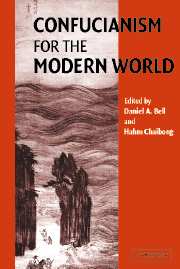Book contents
- Frontmatter
- Contents
- List of Contributing Authors
- Acknowledgments
- Editors' Note
- Introduction: The Contemporary Relevance of Confucianism
- PART I CONFUCIAN PERSPECTIVES ON DEMOCRACY
- 1 Constitutionalism, Confucian Civic Virtue, and Ritual Propriety
- 2 The Challenge of Accountability: Implications of the Censorate
- 3 Confucian Democrats in Chinese History
- 4 Mutual Help and Democracy in Korea
- 5 A Pragmatist Understanding of Confucian Democracy
- 6 The Case for Moral Education
- PART II CONFUCIAN PERSPECTIVES ON CAPITALISM
- PART III CONFUCIAN PERSPECTIVES ON LAW
- Epilogue: Why Confucius Now?
- Index
6 - The Case for Moral Education
Published online by Cambridge University Press: 28 August 2009
- Frontmatter
- Contents
- List of Contributing Authors
- Acknowledgments
- Editors' Note
- Introduction: The Contemporary Relevance of Confucianism
- PART I CONFUCIAN PERSPECTIVES ON DEMOCRACY
- 1 Constitutionalism, Confucian Civic Virtue, and Ritual Propriety
- 2 The Challenge of Accountability: Implications of the Censorate
- 3 Confucian Democrats in Chinese History
- 4 Mutual Help and Democracy in Korea
- 5 A Pragmatist Understanding of Confucian Democracy
- 6 The Case for Moral Education
- PART II CONFUCIAN PERSPECTIVES ON CAPITALISM
- PART III CONFUCIAN PERSPECTIVES ON LAW
- Epilogue: Why Confucius Now?
- Index
Summary
In the primary and secondary school curriculum moral education is always mentioned before all other subjects, because the right way of living is more important than anything else. Learning to live as a member of society, as a civilized citizen, is the most important thing. In order to lead a civilized life, we need models, ideas and guidelines, and we need discipline. Our instruction aims at getting the children to think about these subjects, and the final goal is to lead them in the right direction, to lead them to behave as they were taught. That is why moral education always is mentioned first, even before Korean language.
This is how a Korean schoolteacher underlined the importance of moral education in 1990, explaining something that for her was pretty obvious: If you fail to develop social skills, if you can't get along with your colleagues and friends, professional skills may be useless. In a Confucian country a person's human qualities (i.e., that he or she understands his or her role in society and performs in this role according to generally agreed upon norms) come first. This has had top priority in Korean education, and the schoolteacher expressed it quite clearly without making any reference to Confucius or Confucianism. This is probably the most significant aspect to note in a discussion of socialization and education as enculturation.
- Type
- Chapter
- Information
- Confucianism for the Modern World , pp. 161 - 178Publisher: Cambridge University PressPrint publication year: 2003
- 2
- Cited by

